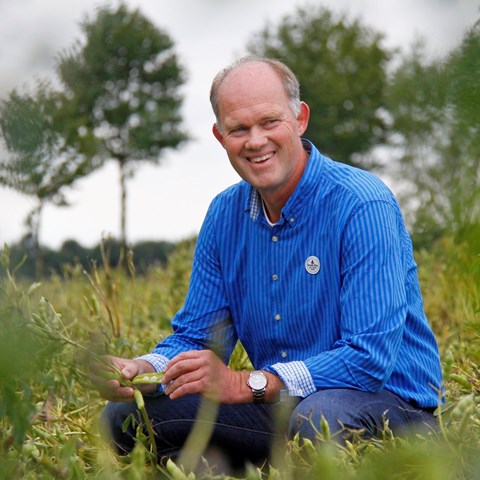Contact
Department of Crop Production Ecology, Agricultural cropping systems
Department of Crop Production Ecology, Ogräsekologi
Riccardo Bommarco, Professor
Department of Ecology, SLU
riccardo.bommarco@slu.se, +46 18 67 24 23

How can African farmers narrow the yield gap, and European farmers reduce fertilizer and pesticide use? Martin van Ittersum, a visiting professor at SLU is searching for the answers.
At the Swedish University of Agricultural Sciences (SLU), we are welcoming Martin van Ittersum as a visiting professor within the August T Larsson Guest Research Programme.
Martin describes his research as divided into two themes.
– The first is about sustainable intensification of food production in areas in the world where the demand for food is predicted to increase a lot, like in Africa and South Asia in particular. The second theme is on circularity, with main applications in the northwest of Europe. How can we improve the cycles of nitrogen, phosphorus and carbon, by better balancing the plant and animal production? How can we make best use of by-products in the food system? Like manure, crop residues, co-products that come with processing plants, meat or dairy products.
Professor Martin van Ittersum is from Wageningen University in the Netherlands.
How come that you are here at SLU in Uppsala?
– The Department of Crop Production Ecology sent in an application for my August T Larsson fellowship. The application was approved, and the Faculty of Natural Resources and Agricultural Sciences offered me the opportunity to stay here for two months a year, for three years. I knew the researchers who wrote the application, from earlier international meetings and PhD defenses, and I was happy with their suggestion. This is actually not my first visit to SLU in Uppsala. In the 1980’s I was here on an internship a couple of months, during my master.
What do you expect from your visits at SLU?
– I hope to collaborate with researchers at SLU and give seminars for colleagues and students. We will have roundtable discussions and plan to jointly contribute to the next Global Food Security Conference*. I hope to meet researchers that I so far have only known from the literature. Together we can work on questions that are relevant for both Sweden and the Netherlands. For examples on questions related to the goals of the European Farm to Fork Strategy. How can we halve the use of pesticides, and decrease the use of fertilizers by 20 percent in just eight years? We have to look at the management of the most important crops in our countries and achieve the targets using knowledge and best practices.
– And I also hope to go ice skating in Sweden, in the winter, Martin van Ittersum adds with a smile.
(*The Global Food Security Conference will be held in Leuven in Belgium, April 9-12, 2024 – Martin will be chairing this conference.)
The Global Yield Gap Atlas
Together with colleagues in Wageningen as well as researchers from the University of Nebraska-Lincoln, Martin van Ittersum coordinates a database called The Global Yield Gap Atlas.
– The atlas can be used in research and development projects, in the context of benchmarking the possibilities for producing more food on existing cropland. What does it mean in terms of water use and nutrients required for the production? Are we approaching the potential limit or do we still have room to increase the production on current agricultural land? This is critical to avoid further expansion of agricultural area at the cost of biodiversity and greenhouse gas emissions, Martin van Ittersum explains.
Riccardo Bommarco, Professor
Department of Ecology, SLU
riccardo.bommarco@slu.se, +46 18 67 24 23